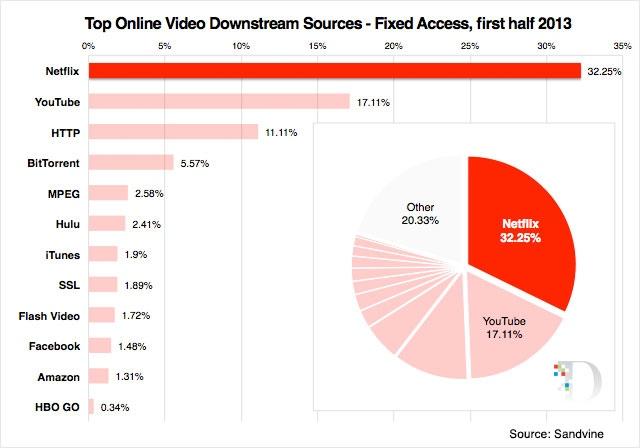Data sent from iTunes represents 1.9 percent of North American Internet traffic every night, a share beyond all other competing digital storefronts, but also well behind the bandwidth served up by Netflix.
Broadband research company Sandvine has been tracking North American bandwidth usage during primetime hours for years, and its latest data summarized Tuesday by AllThingsD shows that Apple's iTunes is responsible for nearly 2 percent of all Internet traffic at those hours. That places the storefront ahead of websites like Facebook, which accounts for 1.48 percent, and Amazon, which takes 1.31 percent.
While iTunes provides video content for purchase or rent, along with music, apps, books and more, it's video-only providers that dominate bandwidth consumption. Netflix alone accounts for 32.25 percent of all nightly downstream traffic delivered over fixed networks to users at home.
In second is YouTube, which accounts for 17.11 percent of traffic, placing it ahead of generic "HTTP" data with 11.11 percent. BitTorrent, which is a popular file sharing format for users who pirate copyrighted material, accounts for 5.57 percent of bandwidth used.
MPEG video downloads came in fifth with 2.58 percent, placing them ahead of Hulu, which streams TV episodes, movies and its own original content with free and subscription accounts available. Hulu finished ahead of iTunes with 2.41 percent.
Apple's iTunes took seventh place among the top bandwidth consuming options with 1.9 percent, placing it just ahead of SSL at 1.89 percent. Rounding out the top services are Flash video (1.72 percent), Facebook (1.48 percent), Amazon (1.31 percent) and HBO Go (0.34 percent).
Of the data used by consumers on their home networks, 20 percent was transmitted over Wi-Fi to devices like iPads, iPhones. That's up from 9 percent a year ago.
While Netflix is dominant on home fixed network connections, YouTube is the primary bandwidth consumer among mobile data users, taking 27.33 percent.
 AppleInsider Staff
AppleInsider Staff








 Thomas Sibilly
Thomas Sibilly
 Wesley Hilliard
Wesley Hilliard
 Marko Zivkovic
Marko Zivkovic

 Malcolm Owen
Malcolm Owen

 Amber Neely
Amber Neely










36 Comments
This is just proof the ISPs need to throttle and cap further. I mean, LOOK at all the people actually using their Internet connections! We can't have that¡
Anyway, it'll be interesting to see how/if this changes after a hypothetical deal to change up the way the Apple TV is served content.
And is this chart reflective of iTunes cloud viewing, iTunes purchasing and downloading, or iTunes as a whole? That's important to know. If it's just purchases, of course it's lower than Netflix/YouTube. YouTube is basically streamed piracy of content and Netflix is legal streamed content.
netflix you stream everything, itunes i can play off my laptop to my apple TV but either way, netflix is a much better deal than a la carte from itunes. for me its netflix and blu rays
Well, I guess if the choice was to watch a movie on FX, USA or one of those other channels with commercials, or watch it on Netflix, I'd chose Netflix every time too. Funny though, I haven't watched any streaming content from Netflix for at least a month. Wonder why I keep paying for it.
[quote name="al_bundy" url="/t/157517/netflix-accounts-for-1-3-of-nightly-home-internet-traffic-apples-itunes-takes-2#post_2326605"]netflix you stream everything, itunes i can play off my laptop to my apple TV but either way, netflix is a much better deal than a la carte from itunes. for me its netflix and blu rays[/quote] They're very different transmission formats and different business models. Netflix seems to be compatible with just about everything with an IP address these days.
Why am I not seeing piratebay in that list? I struggling to believe that bittorrent is that small.